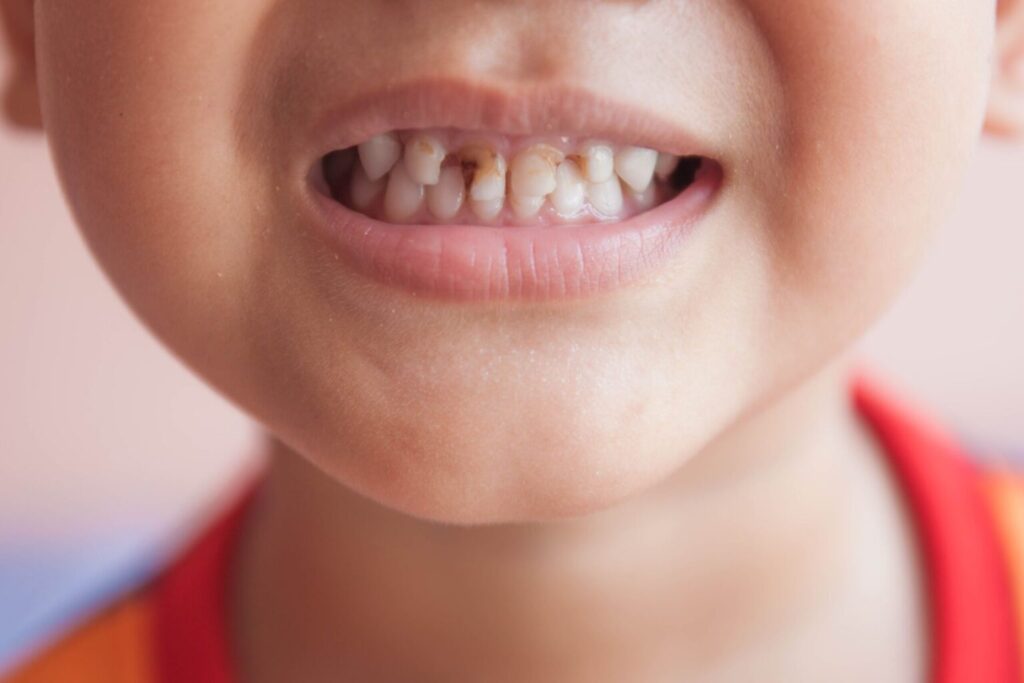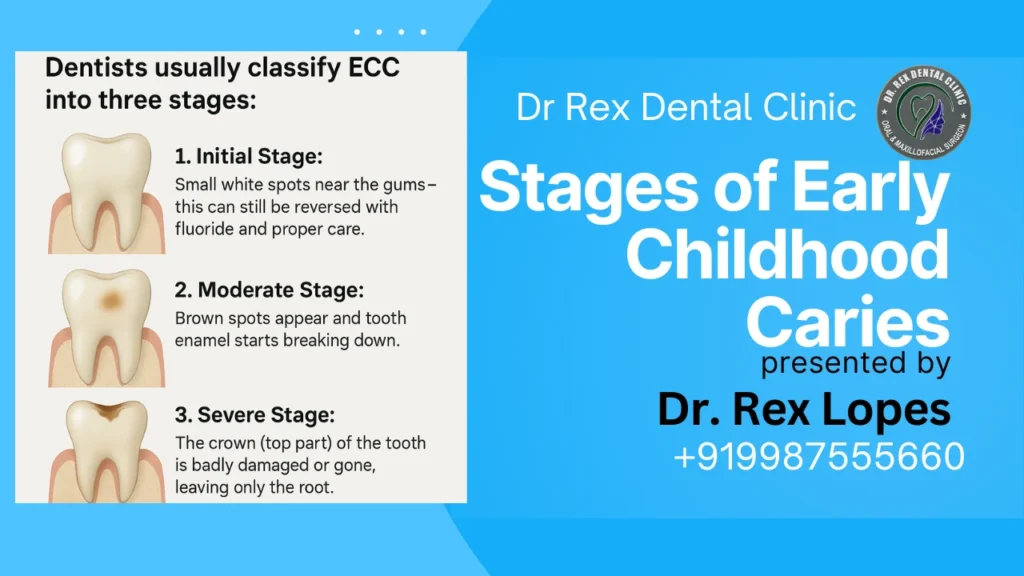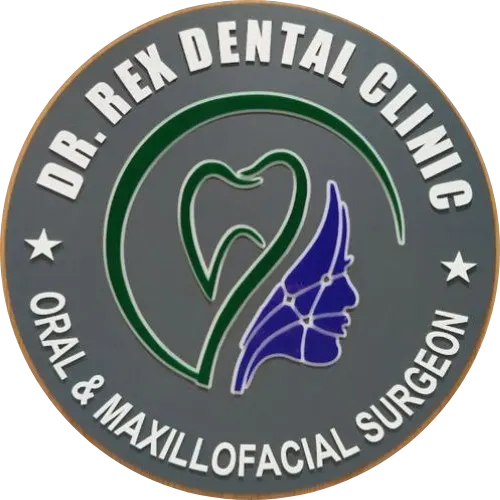Table of Contents
At Rex Dental Clinic, we are noticing more and more young children coming in with Early Childhood Caries (ECC). This is a serious and growing dental problem affecting children all over the world—especially those from low-income or underserved communities. ECC happens when a child under the age of six (specifically 71 months or younger) has at least one tooth that is decayed, missing due to decay, or has been filled.
What is Early Childhood Caries?

Early Childhood Caries is a fast-spreading form of tooth decay that affects babies and toddlers. It usually starts on the upper front teeth (the top middle ones you see when a child smiles), but it can spread quickly to the back teeth as well. This type of tooth decay is unusual because it often starts in areas of the mouth that don’t normally get cavities, like the outer front teeth or even areas between teeth.
The first signs of ECC can be hard to notice. You might see white spots or light brown discoloration near the gums. At this stage, the decay has already started but can still be treated easily. If left untreated, however, the damage can spread fast and destroy the tooth. In some severe cases, only the root of the tooth is left.
How Does ECC Develop?
ECC is usually caused by frequent and long-term exposure to sugary liquids—like milk, formula, fruit juice, or sweetened drinks—especially when a baby goes to sleep with a bottle. These sugary drinks stick to the teeth and feed harmful bacteria in the mouth, which then produce acid that attacks the tooth enamel. Poor oral hygiene, lack of fluoride, and delayed dental visits also play a role in causing ECC.
Once the decay sets in, it can spread from one tooth to another, moving from the upper front teeth to the upper and lower molars at the back of the mouth. This makes eating and brushing painful for the child, which can further speed up the damage.
Stages of Early Childhood Caries

Dentists usually classify ECC into three stages:
- Initial Stage: Small white spots near the gums—this can still be reversed with fluoride and proper care.
- Moderate Stage: Brown spots appear and tooth enamel starts breaking down.
- Severe Stage: The crown (top part) of the tooth is badly damaged or gone, leaving only the root.
What is Severe Early Childhood Caries (S-ECC)?
When ECC gets worse and spreads fast, it becomes Severe Early Childhood Caries (S-ECC). Children with S-ECC often suffer from strong tooth pain. This can make it very difficult for them to eat, drink, sleep, or even speak properly. In some cases, children may need to have their front teeth removed at just two or three years of age. Losing teeth so early can affect how a child learns to talk, chew, and even smile with confidence.
If left untreated, S-ECC can lead to serious health problems like poor nutrition, slower growth, and frequent infections. It also affects a child’s overall comfort and happiness, making them more anxious and withdrawn.
Prevention is the Best Cure
At Rex Dental Clinic, we strongly believe in prevention and early action. The earlier we spot signs of ECC, the easier and less painful the treatment will be. That’s why we recommend that every child visit a dentist by the age of one—or within six months after their first tooth appears.
We also teach parents how to care for their child’s teeth at home. This includes:
- Brushing the baby’s teeth twice a day using a small amount of fluoride toothpaste
- Avoiding sugary drinks, especially before bedtime
- Never letting a child sleep with a bottle
- Cleaning the baby’s gums even before teeth come in
- Limiting snacks and sweets between meals
- Making regular dental check-ups a priority
Final Thoughts
Early Childhood Caries is more than just a dental problem—it can affect a child’s whole body and overall development. But with the right care, education, and habits, it can be prevented and controlled. At Rex Dental Clinic in Virar West, we are here to support parents and protect the health of every little smile. Start early, stay consistent, and help your child grow up with strong, healthy teeth.
What is Early Childhood Caries (ECC)?
Early Childhood Caries is a type of tooth decay that affects young children under the age of six. It happens when a child has one or more decayed, missing (due to decay), or filled baby teeth. It often starts on the upper front teeth and can quickly spread to other areas if not treated.
What causes ECC in babies and toddlers?
The main causes of ECC include frequent consumption of sugary drinks (like milk, juice, or formula), poor brushing habits, letting a child sleep with a bottle, and lack of early dental care. These habits allow bacteria in the mouth to produce acids that damage the teeth.
What are the signs of Early Childhood Caries?
Early signs include white or brown spots near the gum line on the front teeth. As the condition worsens, you may notice holes in the teeth, dark discoloration, or even broken teeth. Children may also show signs of pain or discomfort when eating or drinking.
Can ECC be prevented?
Yes, ECC can be prevented with good oral hygiene and healthy habits. Brush your child’s teeth twice a day using fluoride toothpaste, avoid giving sugary drinks (especially at bedtime), schedule regular dental checkups, and start cleaning their mouth even before the first tooth appears.
When should my child first see a dentist?
It’s best to take your child to the dentist by their first birthday or within 6 months after their first tooth comes in. Early dental visits help detect any problems early and teach parents how to keep their child’s teeth healthy from the start.
